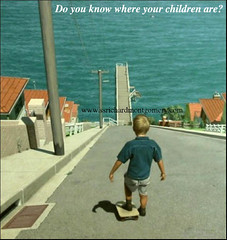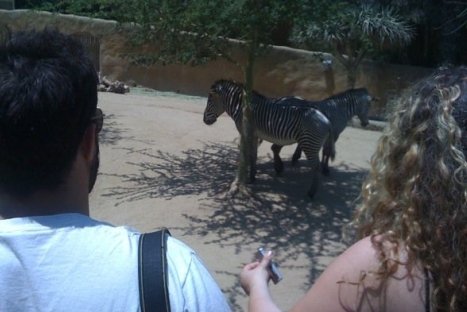
At the root of it all is fantasy. Every technological advancement, every literary masterwork, every civilized progression of humanity is, arguably, a development of fantasy. Some of the most ubiquitous cultural representations of fantasies date back to base mythology about the desire to move beyond the limits of the human body.
The desire to be invisible.
The desire to fly.
The desire to move quickly.
As we've gathered from watching these myths on the big screen, the pursuit of fantasies can have dire consequences, or be rewarding, depending on how and why fantasies are pursued.
(Be careful what you wish for)
(Follow your dreams, kid)
It is the norm that many of our day-to-day activities are qualified depending on how they stack up to our fantasies. Statements like, "It's better than I had imagined," or "It's not as good as I had hoped," are judgments based on ephemeral constructions of the mind; yet daily value is often placed on expectation over reality, from something as simple as the sweetness of a cantaloupe, to something as dire as the potential impact of a variable interest rate.
As a woman born and raised in the city of Hollywood, I have experienced, throughout my life, people moving to my hometown to fulfill their fantasies. And because, as CalArts resident thinker Norman Klein has elucidated upon extensively in The History of Forgetting, we are not a city that tends to hold on to the past, there is always the opportunity to reseed-- The permanently clean slate state.
Deep End Ranch, although an hour and fifteen minutes outside of Los Angeles and situated down a dirt road, does not escape this track. On the contrary, it is a location that is emblematic of the cycle of fantasy-prompted renewal: the property of Deep End has a history of blood, colonization, xenophobia, and more recently, safaris, tea gardens, and English Bulldogs.
When learning about this varied history, one former use grabbed my attention. In the years 1970-84, Peter Lang, son of the filmmaker and TV director Otto Lang, housed and fostered his African-native exotic animal collection on the ranch property, which eventually came to be known as Safari West. Some of the animals roamed free, some were kept in pens. The desire, and the ability, to establish an African native species reserve in California, through the encouragement of a family that made its mark in directing TV episodes of Dakarti ("The Chimp Who Went Ape," "The Killer Lion," "The Elephant Thieves," to name a few) is an amazingly literal congruence of fantasy that has been generationally pursued to reality.
(Lang eventually moved his operation north to Santa Rosa, where it currently exists as a private facility which guides adventure tours and established a non-profit foundation, the Safari West Wildlife Reserve.)
To represent and reflect on the Santa Paula existence of Safari West, I will install 3 sound pieces on the property. The sound pieces are comprised of exotic animal sounds that may have been heard while walking the property of Safari West (Egret, Scarlet Macaw, Zebra, Stork, Antelope, East African Crowned Crane, Vervet Monkey), human spectator sounds made when viewing enclosed wild animals, and an interview with Richard Haller of Santa Paula's Haller Hay company, the former hay delivery man for Safari West in Santa Paula.
(Harry McGowan)
(Greg Bows)
Tuesday, May 12, 2009
Fantasy/Animals/Spectators/Hay: Follow Your Dreams, Kid
Subscribe to:
Post Comments (Atom)













http://www.youtube.com/watch?v=1HHPo3qxomQ
ReplyDeleteBut that won't protect Randy from reality.
Definitely goes in the Jurassic Park category.
ReplyDelete"Whatever really happened there is one truth. A man cannot afford to have a Tiger or Lion grab him by the neck."